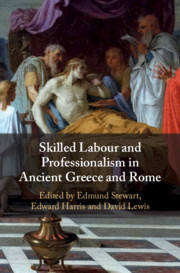Book contents
- Skilled Labour and Professionalism in Ancient Greece and Rome
- Skilled Labour and Professionalism in Ancient Greece and Rome
- Copyright page
- Contents
- Illustrations
- Contributors
- Acknowledgements
- Abbreviations
- Introduction
- Part I Professionals and Professional Identity in Greece and Rome
- Part II Specialization and the Division of Labour in the Ancient City
- Part III Case Studies of Professions 1: Sculpture
- Part IV Case Studies of Professions 2: Music and Athletics
- 9 The Profession of Mousikē in Classical Greece
- 10 Artists of Dionysus: The First Professional Associations in the Ancient Greek World
- 11 Neither Amateurs nor Professionals: The Status of Greek Athletes
- Part V Case Studies of Professions 3: A Profession of Arms?
- Index
- References
11 - Neither Amateurs nor Professionals: The Status of Greek Athletes
from Part IV - Case Studies of Professions 2: Music and Athletics
Published online by Cambridge University Press: 18 September 2020
- Skilled Labour and Professionalism in Ancient Greece and Rome
- Skilled Labour and Professionalism in Ancient Greece and Rome
- Copyright page
- Contents
- Illustrations
- Contributors
- Acknowledgements
- Abbreviations
- Introduction
- Part I Professionals and Professional Identity in Greece and Rome
- Part II Specialization and the Division of Labour in the Ancient City
- Part III Case Studies of Professions 1: Sculpture
- Part IV Case Studies of Professions 2: Music and Athletics
- 9 The Profession of Mousikē in Classical Greece
- 10 Artists of Dionysus: The First Professional Associations in the Ancient Greek World
- 11 Neither Amateurs nor Professionals: The Status of Greek Athletes
- Part V Case Studies of Professions 3: A Profession of Arms?
- Index
- References
Summary
Since the late nineteenth century, scholars have discussed if Greek athletes were ‘amateurs’ or ‘professionals’. Analysing the ancient evidence on time, money, social status and group identity, this article argues that neither of the two terms helps in understanding the social reality of ancient athletes.
Keywords
- Type
- Chapter
- Information
- Skilled Labour and Professionalism in Ancient Greece and Rome , pp. 313 - 332Publisher: Cambridge University PressPrint publication year: 2020



